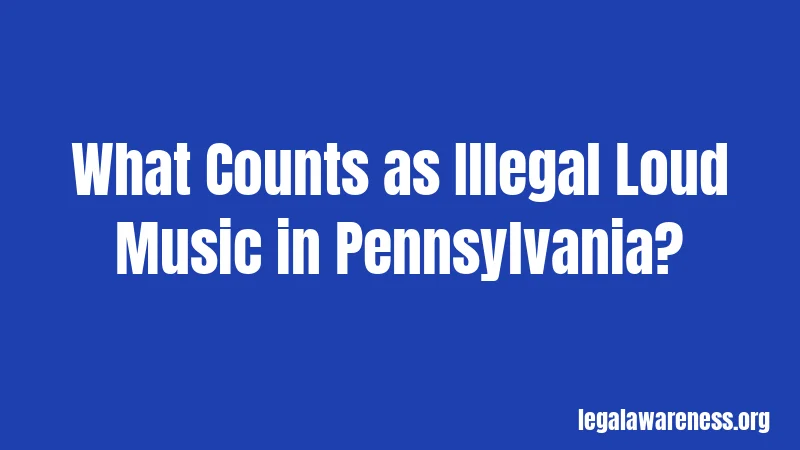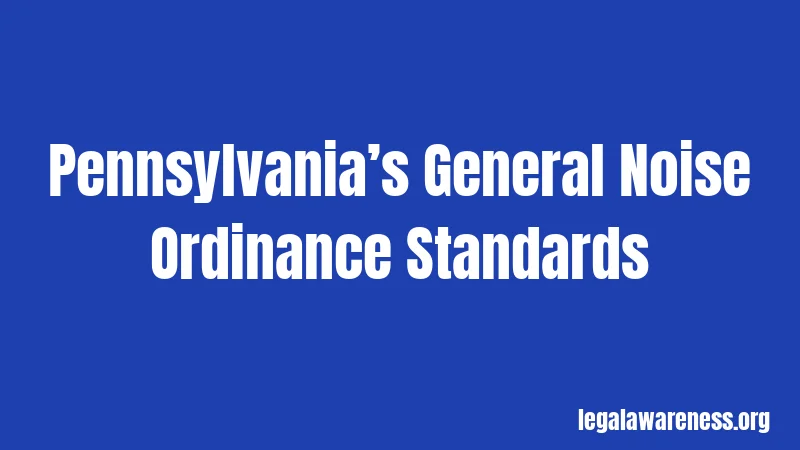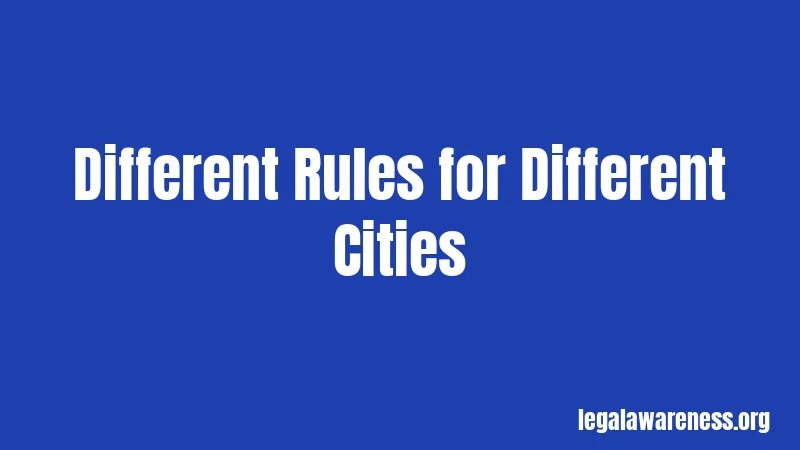Pennsylvania Loud Music Laws (2026): What Actually Gets You Fined
Most people have no idea how strict Pennsylvania’s noise laws really are. Seriously. You could be having a backyard party or blasting music in your car, thinking you’re totally fine. Then suddenly, you’re dealing with a citation and a fine.
Here’s the thing: Pennsylvania takes noise pollution seriously. And loud music? That’s one of the biggest violations. Let’s break down exactly what you need to know so you don’t end up with unexpected legal trouble.
What Counts as Illegal Loud Music in Pennsylvania?

Okay, pause. This part matters. Pennsylvania doesn’t have one single state law that says “music above X decibels is illegal.” Instead, the state lets individual cities and municipalities set their own noise ordinances. Basically, the rules depend on where you live.
That said, here’s the common thread: Most Pennsylvania communities prohibit music or sound that disturbs or interferes with people’s peaceful enjoyment of their homes or property. Think of it like a respect law. If your music is bothering your neighbors, it could be illegal.
The general rule? You need to keep noise at reasonable levels, especially during nighttime hours. What’s “reasonable”? That’s where it gets tricky. Most municipalities define it as noise that’s clearly audible from a certain distance away—often from 50 feet or more from your property.
Basic Pennsylvania Noise Laws
Where Loud Music Gets You in Trouble
You’re probably wondering: what specific situations count as violations? Let me break it down.
In your home: Playing music so loud that neighbors can hear it clearly inside their own homes is typically a violation. Same goes for parties where the sound carries beyond your property line.
In your car: Blasting music in your vehicle—especially with your windows down or subwoofer rattling—can get you cited. This is one of the most common violations, honestly.
In public spaces: Bringing speakers to parks or playing music without a permit is usually against the law. Some cities are stricter than others here.
At night: Most Pennsylvania communities have “quiet hours,” typically between 10 PM and 7 AM (though this varies by city). Loud music during these hours gets you in trouble faster than daytime noise.
Why These Laws Exist
Pennsylvania passed these ordinances to protect public health and quality of life. Constant noise affects sleep, stress levels, and overall wellbeing. Basically, the state decided everyone deserves some peace and quiet.
Pennsylvania’s General Noise Ordinance Standards

Here’s where things get more specific. While cities vary, they generally follow similar patterns based on Pennsylvania’s model noise ordinance and state guidelines.
Most Pennsylvania municipalities use a decibel measurement standard. The acceptable levels usually look something like this: 55-60 decibels during the day in residential areas, and 45-50 decibels at night. If you’re wondering what that sounds like, 55 decibels is roughly the volume of a normal conversation. Anything louder than that, especially in residential neighborhoods, starts running into trouble.
Now, not every city actually uses a sound meter to measure noise. Many police officers and code enforcement officers use what’s called the “plainly audible” standard. If they can clearly hear your music from a distance away (usually 50-100 feet), that’s violation territory.
Penalties for Loud Music Violations in Pennsylvania
So what happens if you get caught? Here’s where it gets serious.
First offense: You’re typically looking at a citation with a fine ranging from $50 to $300, depending on your municipality. Some cities are more lenient than others. First-time offenders sometimes get warnings too.
Second offense: The fine usually jumps to $100 to $500. Patterns of behavior make authorities less sympathetic, honestly.
Repeated violations: If you keep getting citations, fines can reach $500 to $1,000 or more. In some cases, you might face a misdemeanor charge instead of just a violation. That’s way more serious.
Community service: Some municipalities can order you to complete community service hours instead of (or in addition to) paying a fine.
Criminal charges: If your noise disturbance is extreme or repeated constantly, prosecutors can charge you with a misdemeanor. This could mean court appearances, possible jail time, and a criminal record.
Wait, it gets worse. If you get charged with a misdemeanor for excessive noise, you could face up to 90 days in jail and fines up to $300. A criminal record follows you around when you apply for jobs, housing, or loans. Suddenly, that party doesn’t seem worth it, right?
Different Rules for Different Cities

Here’s something important: Pennsylvania’s major cities have their own specific ordinances. Let me give you some examples of how this varies.
Philadelphia: The city has strict noise laws enforced aggressively. Loud music violations can result in fines up to $300 for first offenses. Quiet hours run from 10 PM to 7 AM. Philadelphia’s code enforcement takes this seriously.
Pittsburgh: Similar rules apply. First violations run $50-150, with increasing penalties for repeat offenses. Quiet hours are 10 PM to 7 AM in residential areas.
Smaller municipalities: Many smaller towns have quieter ordinances. Some restrict noise even more strictly than major cities. You could face fines sooner in a rural area than in Philadelphia, actually.
The point? Check YOUR specific city or township rules. What’s legal in one Pennsylvania town might be illegal five miles away. You’re not alone in finding this confusing, honestly. Most people don’t realize how much the rules change by location.
Special Circumstances and Exceptions
Not everything loud is illegal. There are actually some exceptions worth knowing about.
Emergency vehicles and sirens: Obviously, ambulances and fire trucks are allowed. No one’s going to cite them for noise violations.
Construction: Daytime construction noise gets a pass (within reasonable limits). Most ordinances allow construction between 7 AM and 6 PM on weekdays.
Public events with permits: If you get an official permit for a concert or public gathering, you’re covered. The permit essentially gives you legal protection for that specific event.
Protected activities: Some cities have exemptions for things like school events, religious services, or political gatherings. These are protected even if the noise level is high.
Alarms and warnings: Safety alarms get exceptions too. Car alarms and home security systems are allowed, even though they’re annoying.
Here’s the key difference: if you organize something officially with a permit, you’re protected. If you’re just throwing an impromptu party without authorization, you’re vulnerable to citations.
What About Your Right to Make Noise?
Fair question. You do have the right to play music in your home. The restriction kicks in when that noise bothers others. This is basically a balance between your freedom and everyone else’s right to quiet enjoyment of their property.
Think of it like your right to free speech. You can speak freely, but you can’t yell “fire” in a crowded theater. Similarly, you can enjoy music, but not at volumes that disturb the peace.
Pennsylvania courts have consistently sided with municipalities protecting residents from excessive noise. This one’s probably the most important rule: your right to make noise stops where your neighbor’s right to quiet enjoyment begins.
How to Avoid Getting Cited for Loud Music
Okay, here’s what you actually need to do. These are practical steps.
Keep music at reasonable volumes: Use your common sense. If you can’t hear someone talking normally over your music, it’s probably too loud. This applies to parties, your home, and especially your car.
Be mindful of quiet hours: In most Pennsylvania cities, 10 PM to 7 AM is quiet time. After 10 PM, keep it down. This alone prevents most violations.
Tell your neighbors: Trust me, this works. If you’re planning a party, give neighbors a heads-up. They’re way more forgiving when they expect noise.
Use headphones and earbuds: Want to blast music without legal risk? Headphones are your friend. No one can cite you for music only you can hear.
Get permits for events: Throwing a bigger gathering? Check if you need a permit. Many municipalities require them for parties with large guest lists.
Soundproof if possible: If you love loud music, invest in basic soundproofing. Heavy curtains, weather stripping on doors, and acoustic panels help contain sound.
In your car, keep windows up: One simple change reduces the sound traveling to neighbors. Your car’s sound system sounds fine with the windows closed.
Respond to complaints professionally: If someone complains about your noise, take it seriously. Ignoring complaints can escalate the situation and lead to police involvement.
What Happens If Police Show Up
So you’re having a party and the police arrive about noise. Here’s what typically happens.
First, they’ll likely give you a warning. Police often prefer warnings over citations. They’ll tell you to turn the music down. Comply immediately. This usually ends the interaction.
If you refuse or it’s a repeat issue, you’ll get a citation. The officer will write you a ticket for a noise violation. You’ll have information about paying the fine or contesting it in court.
You have the right to ask for a hearing. You can contest the citation in traffic court (or the city magistrate’s office, depending on your area). You can explain your side and potentially argue the violation wasn’t legitimate.
Here’s the thing: showing up prepared helps. Bring documentation, explain circumstances, and be respectful. Courts sometimes reduce fines for first-time offenders who show they take it seriously.
Recent Changes to Pennsylvania Noise Laws
Pennsylvania hasn’t made major statewide changes to noise laws recently. However, some individual cities have updated their ordinances in 2023-2024 to be clearer and more enforceable.
Philadelphia updated its code to be more specific about noise level measurements. Pittsburgh clarified its quiet hours and created better enforcement procedures. Smaller towns are also updating ordinances as they modernize their codes.
The general trend? More enforcement, clearer definitions, and stricter penalties. Cities are taking noise pollution more seriously than ever.
Frequently Asked Questions
Can I get arrested for playing loud music? For a simple noise violation, you’ll get a citation, not an arrest. However, if it’s a repeated misdemeanor charge or extreme disturbance, yes, arrest is possible. Don’t let it get there.
What if my neighbor is being unreasonable about noise? Document everything. Keep records of when you play music, volume levels, and dates. If you’re acting reasonably, code enforcement often sides with you. But honestly, just try to be neighborly first.
Do I need a permit to have a party? It depends on your city and party size. Small gatherings usually don’t require permits. Large parties (50+ people) often do. Check your local municipal code or call your city’s code enforcement office.
Can I play loud music during daytime hours? Daytime noise rules are more lenient than nighttime. However, “loud” is still relative. Even daytime music can violate ordinances if it’s excessive. Keep it at reasonable levels whenever you play it.
What’s the difference between a citation and an arrest? A citation is a written ticket you pay or contest. An arrest means police take you into custody. You’ll face far more serious consequences from an arrest than a citation.
Does Pennsylvania have a statewide noise law? No. The state allows municipalities to set their own standards. This is why rules vary so much across Pennsylvania. Your specific city’s ordinance is what matters.
Final Thoughts
Pennsylvania’s loud music laws aren’t trying to ruin your fun. They’re designed to protect everyone’s right to peaceful enjoyment of their homes. Basically, it comes down to respect and common sense.
Keep your music at reasonable volumes. Be mindful of quiet hours. Let neighbors know when you’re planning something louder. Wear headphones when possible. Get permits for big events. These simple steps keep you out of legal trouble.
Now you know the basics. Stay informed, be respectful of others, and when in doubt, check your specific city’s ordinance or ask a lawyer. It’s way easier to follow the rules than to deal with citations and court appearances. Trust me on that one.
References
Pennsylvania Consolidated Statutes, Title 75 (Vehicle Code) – Noise Regulations https://www.legis.state.pa.us/cfdocs/legis/LI/consCheck.cfm?txtType=HTM&ttl=75
Philadelphia Code, Title 9 Chapter 9100 – Noise Control Ordinance https://codelibrary.amlegal.com/codes/philadelphia/latest/philadelphia_pa/0/0/9/9100
City of Pittsburgh Code, Chapter 623 – Noise Control https://library.municode.com/pa/pittsburgh/codes/code?nodeId=PITSBURGH_PA_CODE_CH623
Pennsylvania House Bill 2157 (2020) – Environmental Quality Board Noise Guidelines https://www.legis.state.pa.us/cfdocs/billinfo/billinfo.cfm?syear=2019&sind=0&body=H&type=B&bn=2157
National Association of Noise Control Officials – Pennsylvania Resources https://www.nanoco.org
Municipal Code Corporation – Pennsylvania Municipal Ordinances Database https://www.municode.com/
Pennsylvania Department of Environmental Protection – Noise Control Resources https://www.dep.pa.gov/Business/Air/Pages/Noise-Control.aspx
